This article may contain affiliate links. Please see our affiliate disclaimer in the footer menu for more information. Thank you for your support!

Are you a proofreader (or an aspiring one) who wants a comprehensive overview of the best online proofreading jobs for beginners? I’ve taken a ton of time to do the investigative work for you to find the best beginner-friendly opportunities and differentiate between companies that hire proofreaders vs. those that only hire editors who are sometimes tasked with proofreading.
A significant difference exists in the scope of work done by a proofreader vs. an editor. If you’re a proofreader like me, you certainly don’t want to take on a job that appears to be for a proofreader but is actually intended for an editor.
Also, if you’re serious about making decent money from proofreading, you’ll need adequate training. In case you haven’t gotten training, I penned a post that discusses reputable proofreading courses.

If you’re prepared to proceed along the paved path to procure payment via online proofreading, let’s pound the pavement! 😉
What Is Proofreading?
It’s essential to know precisely what proofreading entails when you’re looking for jobs.
Proofreading involves finding and fixing punctuation, spelling, grammar, capitalization, and formatting errors. It also entails looking for misused words (usually homophones) and words that have been repeated or omitted.
My Research Process for Developing This Job List
It was often unclear which editorial professionals (proofreaders/copy editors/editors) companies hire because terms like proofreading and editing are used so loosely. Therefore, I reached out to these businesses. I’ve sent numerous emails, filled out several contact forms, and talked to customer service representatives.
I wanted to give you accurate information so you can save lots of time hunting for jobs!
Top-Notch Tip: When searching for proofreading jobs, read the job description carefully to ensure it’s what you’re looking for!
Since proofreading and copyediting overlap, I’ve included three businesses that hire copy editors at the end of this list.
Many proofreaders (including myself) learn copyediting to expand their skill set and make more money.
How This List Is Organized
I’ve grouped the jobs (all are entry-level) listed in this article according to where you can find them:
- Freelance Platforms
- Job Boards with Remote Work Listings
- Online Proofreading and Editing Companies
The online proofreading and editing companies are roughly organized from least to most selective.
Since job availability is subject to change, please visit the websites where you’re interested in applying to see the most up-to-date information.
Note: You’ll notice I haven’t given any information about expected pay rates since many businesses don’t include these numbers on their websites. (Of course, more selective companies tend to offer higher pay.)
Is Experience Needed for the Jobs in This Article?
None of the websites included in this article list proofreading experience as a requirement on their website, except ProofreadingPal. However, you can work for ProofreadingPal—no experience needed—if you meet their education requirement (listed in the next section below).
The job boards listed will have opportunities for beginners, but you’ll also find positions where experience is needed.
Is a Degree Needed for the Jobs in This Article?
Three of the online proofreading and editing companies on the list require applicants to have a college degree:
- Proofessor requires you to have a degree from a UK/Ireland university.
- ProofreadingPal wants you to have a bachelor’s degree and be enrolled in a US university as a grad student (with a minimum 3.5 GPA).
- CACTUS Communications (copy editors only) requires you to hold a master’s or PhD.
The Best Online Proofreading Jobs for Beginners

FREELANCE PLATFORMS
One of the best ways to start as a beginner proofreader is by working on a freelance platform.
These platforms are marketplaces that bring together buyers (clients) and sellers (freelancers).
Remember that although the platforms take a cut of your pay (usually 10%–20%), you’ll save a lot of time by not having to market yourself.
On the freelance platforms mentioned below, you set up a profile (it’s free) so clients can see who you are and what you offer.
Except for Fiverr, you need to write a proposal (a sales pitch) to every client you’re interested in working with. The most challenging part of selling your services on these marketplaces is getting your first few clients.
1) Fiverr

Fiverr is one of the most well-known freelance platforms, and it’s where I got my start.
I love that you don’t have to send proposals on Fiverr. Instead, clients come to you if they’re interested.
Fiverr takes 20% of everything you earn.
Requirements: Fiverr isn’t selective.
Availability: A boatload of clients on Fiverr need proofreading and copyediting services; however, you’ll have a lot of competition.
Since getting your first handful of clients will probably be your biggest challenge, I wrote this in-depth article: “How to Succeed on Fiverr: 41 Solid Tips for Fiverr Sellers.” Although the post is relevant to all Fiverr sellers, I customized it for proofreaders and copy editors since you all are my people! 😊
2) Freelancer
Freelancer is another popular freelance platform.
Freelancer takes 10% or $5 (whichever is greater) for fixed-price projects and 10% for hourly projects.
Requirements: Freelancer isn’t selective.
Availability: Proofreading and copyediting jobs are easy to find on Freelancer. Focus on creating a solid profile and writing short but sweet proposals tailored to each job.
3) Guru
Guru is a lesser-known platform, but it’s still a good option.
Of course, you don’t have to limit yourself to working on just one marketplace.
Guru takes 5%–9% of your earnings, depending on your membership plan. The basic plan is free, and the rest are paid. Here’s the link to see what you get with each plan.
Requirements: Guru isn’t selective.
Availability: Although many clients on this platform seek programmers and developers, you can still find numerous customers looking for proofreaders and copy editors. These jobs are listed in Guru’s “Writing & Translation” category.
4) Upwork
You’ve probably heard about Upwork due to its popularity.
Upwork takes 10% of your pay.
Requirements: Upwork isn’t selective.
Availability: You’ll find plenty of proofreading and copyediting jobs on this platform!
5) PeoplePerHour
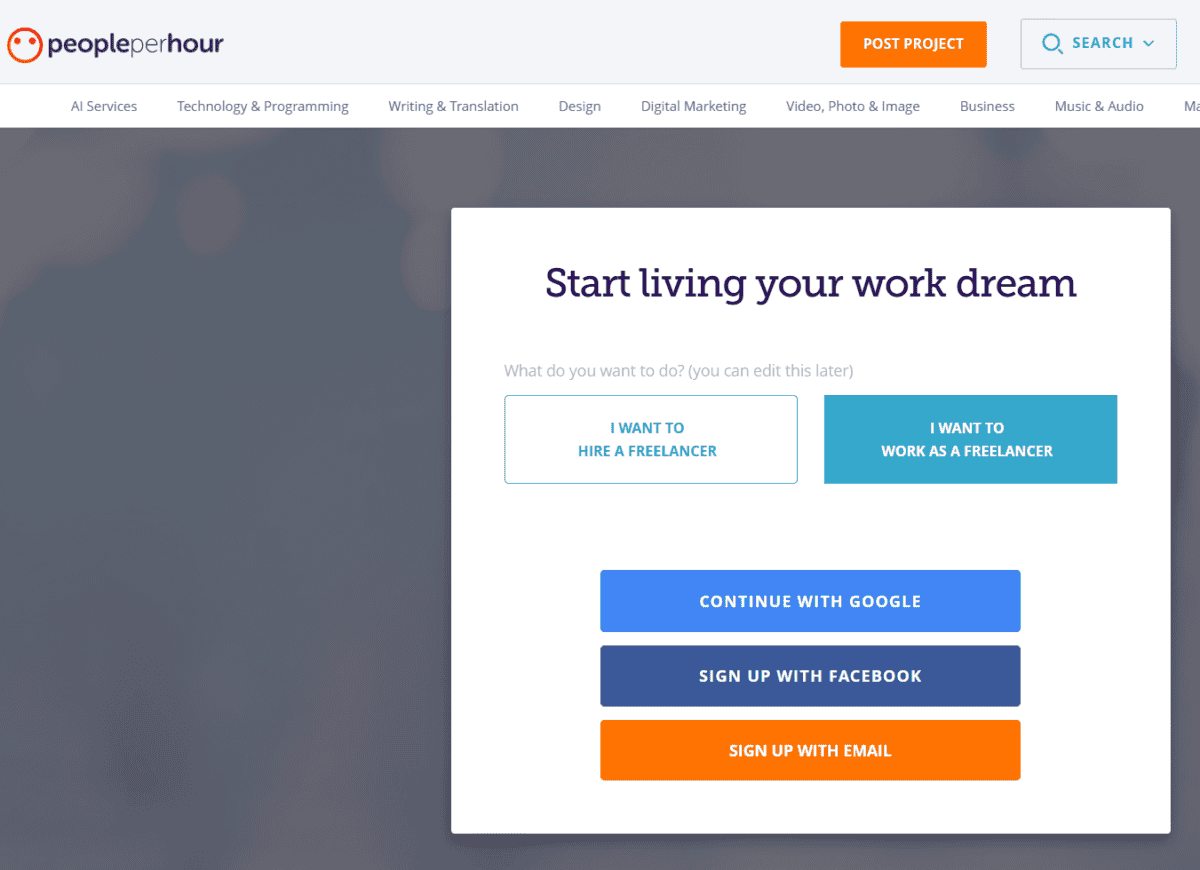
PeoplePerHour is another platform to consider. They allow you to send 15 proposals per month for free. You can purchase additional opportunities (credits) to send more proposals. These credits roll over each month if you don’t use them.
PeoplePerHour takes a percentage of your earnings according to your lifetime billings with each client.
Here’s the breakdown:
| Percentage Taken | Amount Billed |
|---|---|
| 20% (excl. VAT) | under £250 |
| 7.5% (excl. VAT) | £250–£5,000 |
| 3.5% (excl. VAT) | over £5,000 |
Requirements: They don’t mention specific requirements; however, you have to apply and be approved to work on the platform. If you’d like to start an application, please click here.
Availability: My guess from looking at this site is that it has fewer jobs than Fiverr, Freelancer, and Upwork. However, I think it’s still a good option since it’s a reasonably well-known platform.
6) Hubstaff Talent
Hubstaff Talent is a freelance marketplace where you can start a profile and upload your résumé. A great feature of this platform is that it doesn’t charge buyers or sellers any fees.
“Hubstaff Talent does not take any commission fees and is 100% free of charge.”
– Hubstaff Talent
Requirements: You have to submit your profile for approval, which usually takes two business days. This article from Hubstaff Talent will help you through the process of creating a profile.
Availability: The last time I checked, I didn’t see any proofreading jobs. However, many freelancers with a profile on Hubstaff only offer proofreading services, so I assume relevant jobs are occasionally posted.
JOB BOARDS WITH REMOTE WORK LISTINGS
Job boards are another great place to search for freelance proofreading jobs.
These boards (except for FlexJobs) usually post in-house positions; however, you can find opportunities to work from home by typing “remote” into the job location search bar.
Below is a list of some of the most popular job boards online.
7) FlexJobs

FlexJobs has some excellent remote opportunities, but you have to pay to use their website. Here are the fees according to the period you subscribe to their site:
| Time Subscribed | Price |
|---|---|
| two weeks | $2.95 |
| three months | $29.85 |
| one year | $71.40 (best value) |
Their research team screens every job they display to ensure you find professional and legitimate opportunities. They have an A+ rating by the BBB and offer a no-risk satisfaction guarantee to their users:
“We want our users to be happy with our service, and if for any reason you’re not, simply let us know you’d like a refund within 14 days. You’ll get it. It’s that easy.”
– FlexJobs
8) Glassdoor
Glassdoor is a decent place to look for proofreading jobs and a super site to find out how well employees and freelancers rate companies.
The ratings on Glassdoor are based on factors like work/life balance, compensation and benefits, and senior management.
9) Indeed
Indeed is another great spot to scope out potential jobs. After creating an account on Indeed, you can upload your résumé.
10) Mediabistro

Mediabistro is a site for all types of creative jobs. They occasionally have job opportunities for freelance proofreaders. You can upload your résumé after creating an account.
11) SimplyHired
SimplyHired is another site where you can scout out proofreading jobs. After establishing an account, you can upload your résumé.
12) LinkedIn
LinkedIn isn’t a job board; it’s a popular social networking site for professionals. But it has a board where you can search for remote jobs.
Click the briefcase icon (shown below) to visit the job board. Then, check the “Remote” box.
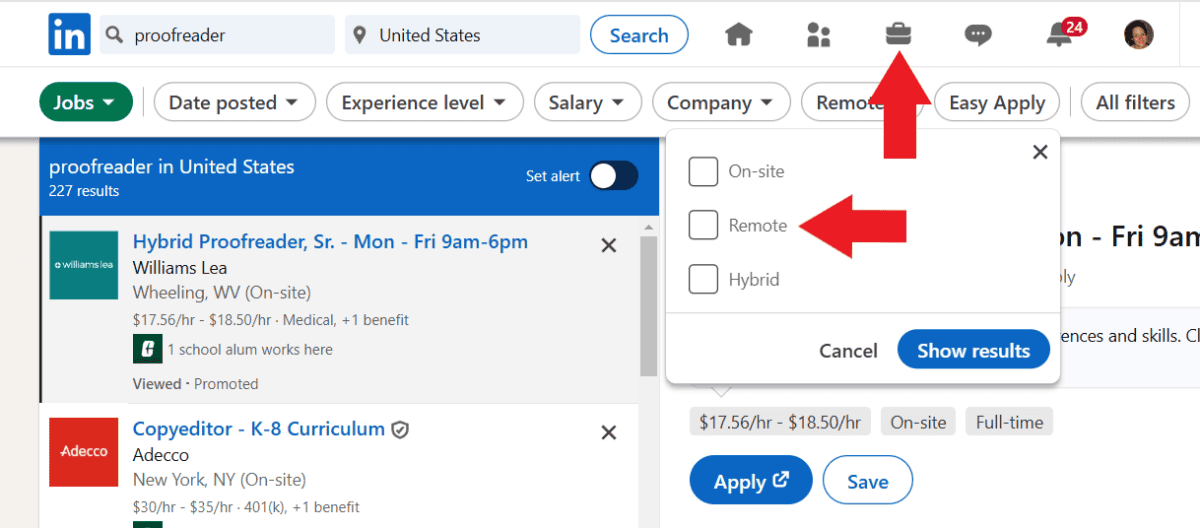
After creating a LinkedIn profile, you can put the #opentowork badge around your profile picture so recruiters and hiring managers know you’re available.
You can also download the LinkedIn app from the App Store or Google Play to receive notifications of new job opportunities while you’re out and about.

13) Google Jobs Results
This isn’t a job board either, but it’s worth mentioning.
By “Google jobs results,” I’m referring to a job list Google generates if you search in a specific way.
To see the jobs, first type a keyword into Google. Below, I searched for “online proofreading jobs for beginners.”
Next, I clicked on the “Jobs” tab directly below the search bar.

Then, I clicked on “Remote” to filter the jobs.
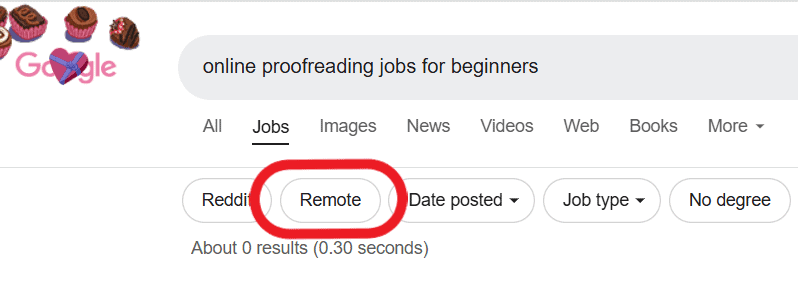
Finally, I saw the list of jobs that Google aggregated from websites:
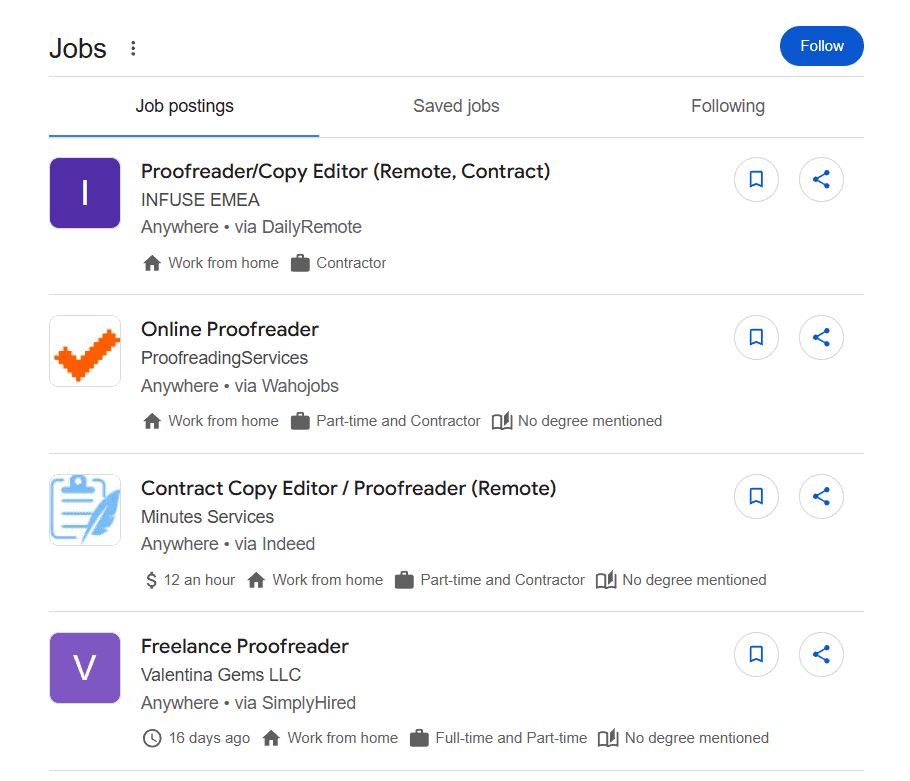
ONLINE PROOFREADING AND EDITING COMPANIES
Numerous online companies provide proofreading, copyediting, and editing services to clients. They hire a pool of freelancers to do the work their customers need.
Some businesses only hire a small group of workers, so plenty of jobs are available for everyone.
However, other organizations hire so many people that finding consistent work is challenging.
The first company in this section is a crowdsourcing site. Crowdsourcing is relying on a large group of people (usually from the online community) to provide services and ideas.
14) Clickworker
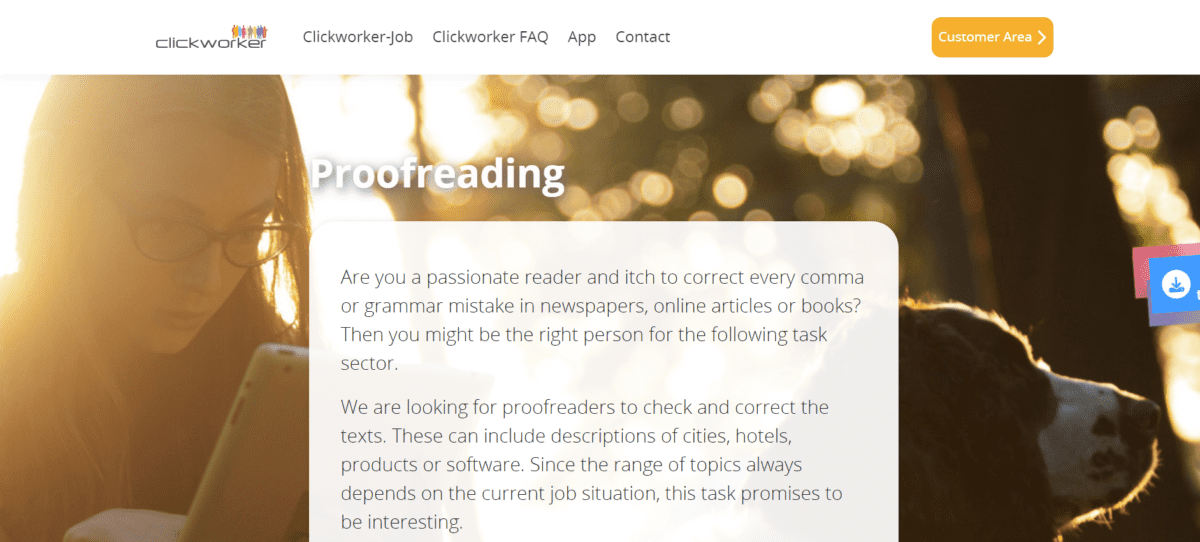
Clickworker is a crowdsourcing platform. If you click the link above, you can learn more about the proofreading jobs offered on this site and register as a Clickworker. After registration, you can take relevant tests to demonstrate your skills.
Requirements: Clickworker isn’t selective.
They say you need to have a strong command of your native language and be able to follow instructions. You have to qualify to take on a few “text creation” jobs before taking the proofreader assessment exam, which you can only take once.
Availability: After you register for a Clickworker account, you’ll gain access to available jobs. Those who continually deliver high-quality work gain access to higher-paying gigs.
However, the consensus is that the pay is quite low, which makes sense due to the lack of selectivity.
15) R3ciprocity

Professor David Maslach is the creator of R3ciprocity. He’s a chemical engineer with a doctorate in strategic management.
David created the platform for academics and grad students to give each other feedback on their writing.
When you edit or proofread the work of others, you earn credits. You can use the credits to have someone edit or proofread your writing.
The platform works on the simple principle of give and take.
Before you can work on other people’s writing, you need to be approved by a R3ciprocity admin. You’ll be required to work on several documents that are less than one page long.
I’ve emailed Dave, and he’s super helpful and kind!
It’s possible to be paid to work on this platform after the admin team receives enough feedback about your work.
Requirements: Anyone can participate on R3ciprocity; however, you’ll need the admin team to verify your skills before you can work for money. The platform charges a minimal fee on each paid transaction.
Availability: To learn about opportunities for paid work, you’ll need to create a profile. You can reach out to the support team from the “contact us” section of your profile.
I’m not sure how much money you can make on R3ciprocity, but it’s a great platform to hone your proofreading skills by helping others. And if you need someone to proofread your writing, you can use your credits.
Here’s a brief video from Dave showing how things work on his site.
16) Grammar Chic
Grammar Chic provides a variety of services including editing, writing, and formatting. They hire proofreaders, copy editors, and editors.
Requirements: I recommend emailing them at [email protected] to learn about their current requirements.
Availability: Unknown
17) Proofessor
Based in the UK, Proofessor provides proofreading, editing, rewriting, paraphrasing services, and more.
Requirements: You need to be a native English speaker who has graduated from a UK/Ireland university. You must also have a strong command of English and achieve an excellent score on their tests.
Availability: Unknown
18) ProofreadingPal
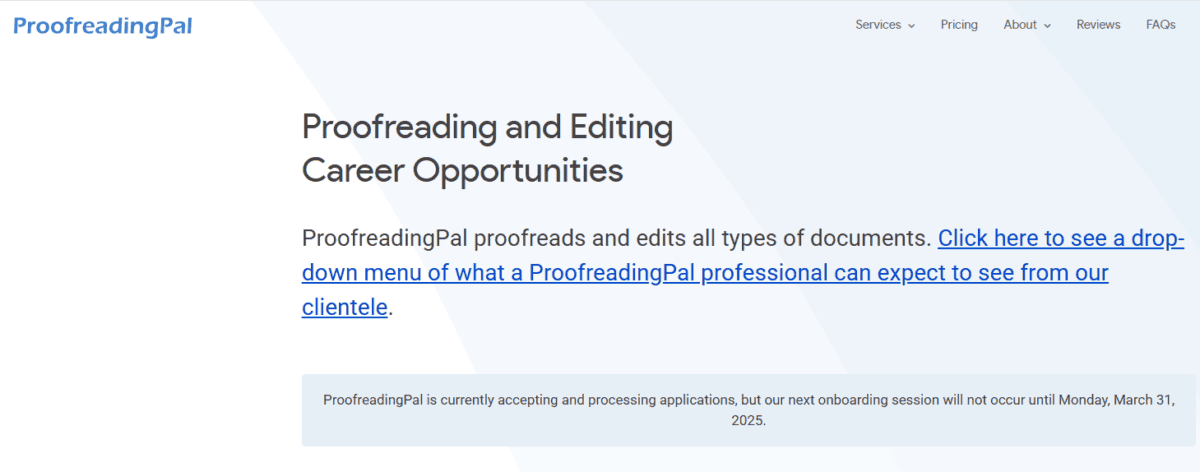
ProofreadingPal provides proofreading and copyediting for a broad range of documents.
They hire proofreaders and copy editors.
Requirements: To work for ProofreadingPal, you need to meet one of the following criteria:
- Be employed by or enrolled as a graduate or postgraduate student in an accredited US university or college and have a GPA of 3.5 or above
- Have a graduate degree and at least five years of proofreading and editing experience (By “editing” experience, they’re referring to copyediting experience.)
Please visit their website for other preferred qualifications.
Availability: They’re looking for qualified candidates who meet one of the requirements mentioned above. If you’re qualified, you can fill out their brief independent contractor questionnaire.
A ProofreadingPal representative will contact you within five to ten business days. They’ll tell you about the next step of their hiring process, which involves a comprehensive timed exam.
19) Writer’s Relief
Writer’s Relief helps writers who want to get published. I spoke with someone on live chat who said they hire proofreaders from time to time.
Requirements: They prefer proofreaders with experience, but beginners are welcome to apply too. However, according to their website, they only hire the top 2% of applicants.
Here’s what the staff member from Writer’s Relief told me about their hiring process:
“We primarily will refer to the proofreading test given, but having proofreading experience would certainly be helpful.”
– Writer’s Relief Staff
Availability: Unknown
20) Gramlee (Copy Editors Only)
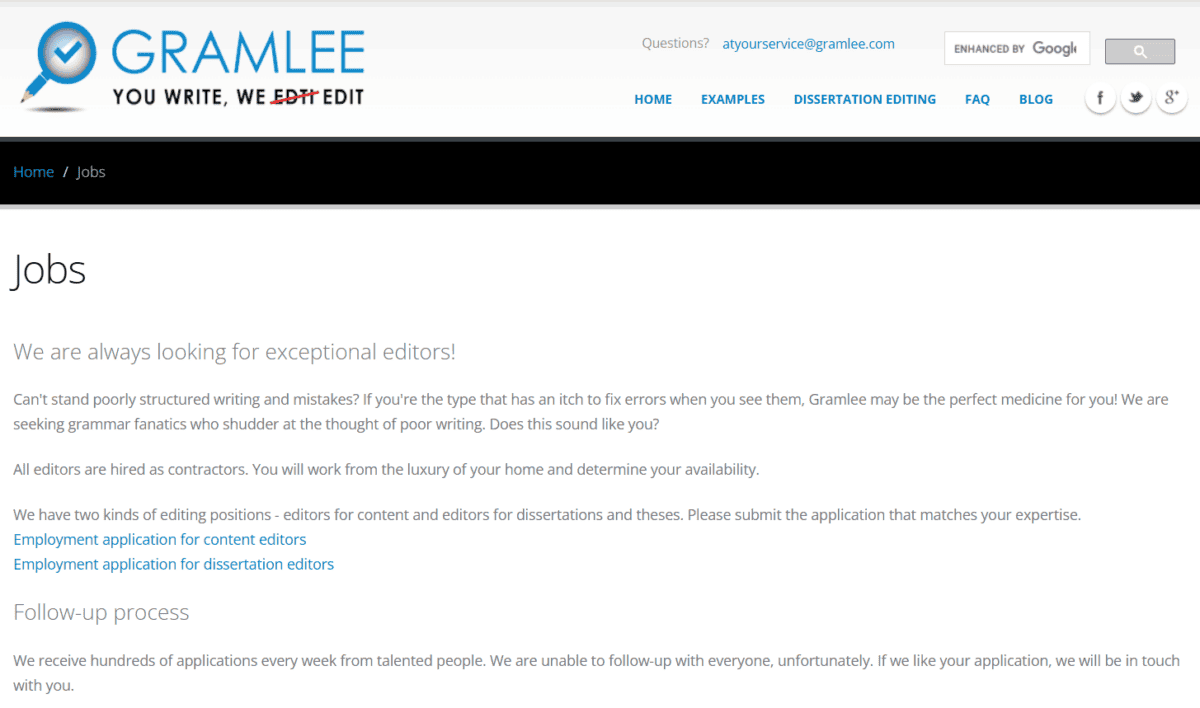
Gramlee offers editing, copyediting, and proofreading services. They only hire copy editors and editors.
Requirements: They don’t mention any specific requirements on their site.
Availability: They’re always looking for extraordinary copy editors and editors. If you’d like to work for Gramlee, you can complete the employment application on their website.
They have one application for content editors and one for dissertation editors.
21) EditorLive (Copy Editors Only)
EditorLive.com was created to provide highly qualified editors with a steady stream of work.
They hire editors who are also responsible for proofreading documents. But it may be possible to acquire a job as a copy editor if you can correct the “flow” of texts—a task typically completed by line editors.
Requirements: You need to have experience writing academic papers on various topics and be familiar with Chicago, APA, AP, MLA, CSE, and other style guides. Please see their website for the complete list of requirements and qualifications.
If you meet all the requirements on their site, you can fill out the application and take the editing test.
Availability: They’re currently seeking qualified editors. However, they only hire editors who live in the following states: Texas, Georgia, Massachusetts, Nevada, and Colorado.
22) CACTUS Communications (Copy Editors Only)
CACTUS Communications aims to make scientific knowledge accessible to everyone worldwide, aiding the development of societies and improving people’s lives.
Requirements: None listed. However, they’ve previously stated that you’re required to have a master’s or PhD in one or more specialized subject areas in the following:
- physical sciences
- engineering
- materials science
- healthcare
- life sciences
- medicine
- surgery
Prior experience was preferred but not mandatory.
Availability: You can check their website to see if they have opportunities for copy editors.
Frequently Asked Questions
Are proofreaders still needed?
Yes, proofreaders are still needed.
People’s written word is a reflection of them in their absence. Since errors in writing can undermine someone’s authority and make them look careless, people seek out proofreaders.
Professionals, entrepreneurs, researchers, students, and job seekers are all examples of people who hire a second pair of eyes to proofread their content.
I authored an article about whether proofreaders are still necessary if you’d like to delve deeper into this topic.
How do I get my first proofreading job?
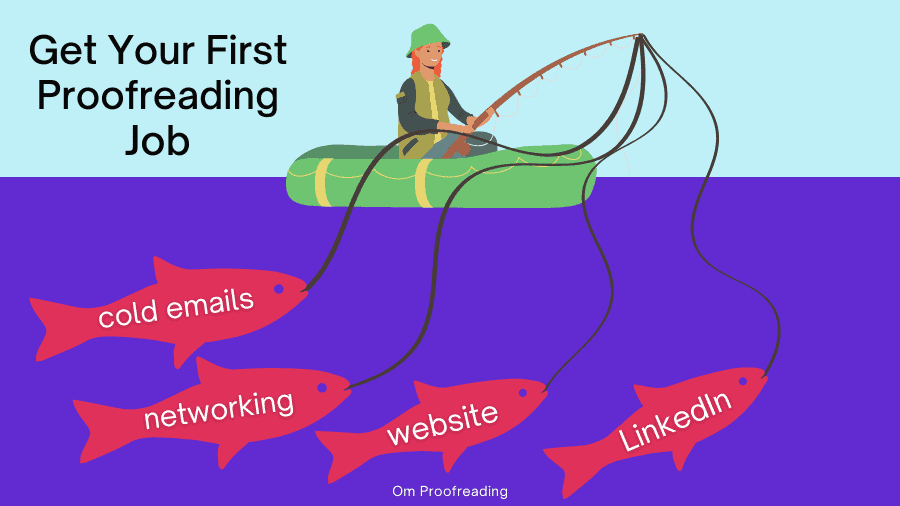
You can employ various tactics to land your first proofreading job.
When fishing for work, it helps to have multiple lines in the water to increase your odds of snagging a gig. But you don’t want to cast so many lines that they become tangled because they’re too much to manage.
Start with a few methods you think will work best, and put all your focus on those.
Here are some solid strategies:
1) Start your own proofreading business online.
Even if your clients don’t find you there initially, having a website shows you’re committed to proofreading. You can display certificates, credentials, and testimonials on your site to attract customers.
Another way to snag your first gig is to hand out business cards to brick-and-mortar companies that may need your services.
Include your website address on your business cards so they can learn more about you.
2) Cold email potential clients.
I know this may not be people’s preferred method, but it can work. If you send thoughtful, tactful, and personalized emails to clients you’d like to work with, you may land some jobs.
For example, try reaching out to the site owners of blogs you enjoy reading.
First, let them know how much you enjoy their content. Then, let them know how you can help.
Although I’m not a fan of advocating that proofreaders do free work, offering a free sample edit can be a way to show the value you can provide. A sample edit means you proofread a small portion (maybe 500 words) of someone’s writing.
3) Establish a profile on LinkedIn.

Even if you choose not to use LinkedIn’s job board to search for proofreading opportunities, I recommend creating a profile on the site.
For best results, fill out your profile completely, and include the badge around your profile picture indicating you’re open to work.
It’s not too difficult to get set up on the site, and your profile can work for you in the background while you take steps that require more effort.
4) Network with other proofreaders and writers.
You can find groups for proofreaders and writers on Facebook and LinkedIn. Joining these groups can lead to information about proofreading companies that are hiring or writers who need a second set of eyes.
To get the most out of these groups, focus on adding value.
Try answering people’s questions and offering helpful information and advice. Then, if the group allows it, you can pitch your services. Just make sure not to come across as too spammy since this can cause more harm than good.
I wrote an article about finding proofreading clients if you’d like a few more ideas about how to get your first job.
How much do beginner online proofreaders make?
According to ZipRecruiter, as of February 2025, the average yearly salary for an online proofreader in the United States is $57,520.
This amount translates to about $28 per hour.
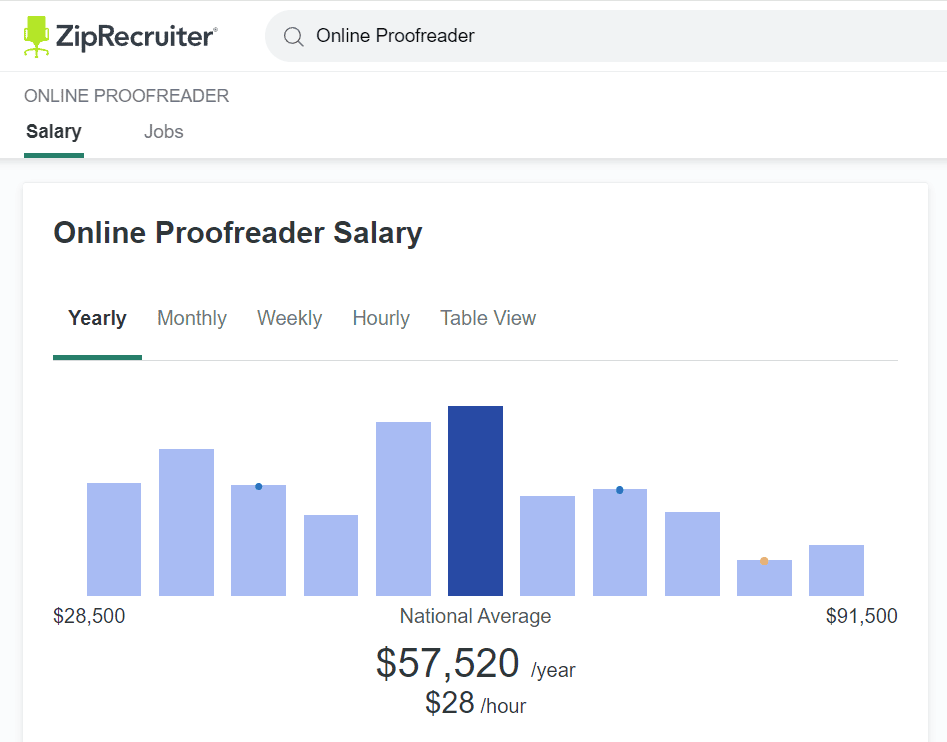
ZipRecruiter shows that the majority of online proofreader salaries range from $42,500 (25th percentile) to $70,000 (75th percentile).
As a beginner proofreader, you can expect to make a salary toward the lower end of this range.
Novice proofreaders make roughly $12–$18 per hour.
Can proofreaders work from home?
Yes! Proofreaders can be home-based.
You’ll find options for part-time and full-time remote proofreading work.
How can I become a proofreader online with no experience?
To become a proofreader online, I recommend taking a reputable proofreading course so you’ll be in a good position to land jobs.
Proofreading entails more than most people realize, so getting proper training is essential.
A comprehensive proofreading class will teach you the needed skills, give you confidence, and enable you to compete with other proofreaders who have received formal training.
What skills and qualifications do I need to be a proofreader?
The only qualification you need to be a proofreader is the appropriate skill set. I created an article about the necessary set of proofreading skills if you’d like to know more.
Although some proofreading jobs require a degree (usually in English or journalism), plenty of opportunities are available to those without a degree.
Finally, having a proofreading certificate is preferable but not absolutely necessary.
Having one gives you an edge since it shows potential clients you’ve received training for the job.
Is proofreading a good side hustle?
Proofreading is a good side hustle because it requires minimal startup costs and can be learned relatively quickly.
Another advantage is that proofreading can be done from home. You can even proofread while you travel as long as you have a solid internet connection.
Om Proofreading has an article about the reasons why proofreading is a great side job.
What tools do online proofreaders need for their work?
Fortunately, online proofreaders don’t need an abundance of expensive tools.
They need a laptop or desktop computer and a stable internet connection. I prefer a laptop so I can be around people while I work.
We can divide the other tools you need into two categories: software and books.
The Software You Need

Online proofreaders need two word processors:
- Microsoft Word
- Google Docs
You’ll need a paid version of MS Word.
Free versions aren’t suitable since they can cause formatting problems and don’t offer the same protection for clients’ documents as the paid version.
Proofreaders use the Track Changes feature in MS Word to work on texts.
The earliest version of Word I’d recommend is 2016.
Support for Microsoft Word 2013 ended in April 2023.
With Google Docs (it’s free), you’ll learn to use the Suggesting feature.
Some proofreaders may want to learn how to use Adobe Acrobat software so they can proofread PDFs. However, this software isn’t necessary since most documents are proofread using Word or Google Docs.
Two Optional Tools for Proofreaders
You may want to consider two other tools to improve your efficiency:
- Grammarly
- PerfectIt
I wrote an in-depth review of Grammarly and a detailed review of PerfectIt if you’d like to know more about how these software programs can help you proofread people’s prose.
The Reference Books You Need
At a minimum, you’ll need two books:
- a good dictionary
- a style guide
I use Merriam-Webster’s Collegiate Dictionary, 11th Edition, since it’s the dictionary recommended by the most thorough style guide available—The Chicago Manual of Style (CMOS).
I refer to CMOS for most of my proofreading work. It’s one of the most frequently used and reputable guides and the gold standard in the US book publishing industry.
Merriam-Webster’s Collegiate Dictionary, 11th Edition, and CMOS are available online and as hard copies.
If you’d like to learn about other popular style guides, I discuss them in my post about suggested books for proofreaders.
You may also want to consider purchasing The Best Punctuation Book, Period. It’s inexpensive and beloved by people who work on error patrol! 😉I talk about this book in the post I linked to in the previous paragraph.
What’s the difference between proofreading, copyediting, and editing?
Proofreaders correct grammar, punctuation, capitalization, spelling, and formatting errors. They work at the word level to catch mistakes that were overlooked during previous editing stages.
Copy editors work at the sentence level. Their primary focus is to make writing clear, concise, consistent, comprehensive, and correct. They also fix the same types of mistakes that proofreaders do.
Line editors and developmental editors work at the paragraph level and on the overall document, respectively. Line editors focus on improving a text’s language, and developmental editors improve the text’s content and structure.
If you’re an editor, I published a post about jobs for developmental and line editors.
I sincerely hope this article has given you many avenues to find online proofreading work if you’re a beginner.
After you get some experience, you can check out my article about online proofreading work for experienced proofreaders to find more lucrative options.
I wish you luck as you progress on your proofreading path. May it be paved with platinum!
Best wishes to you!
“Be the reason someone smiles. Be the reason someone feels loved and believes in the goodness in people.”
– Roy T. Bennett

Recent Posts
Punctuation is important because it enables us to communicate our message clearly and effectively. Without punctuation, we wouldn’t understand how units of a sentence relate to one another or how...
Although you're probably somewhat familiar with adverbs, you may be unaware of sentence adverbs. As a trained proofreader who has studied the parts of speech, I can help you understand this unique...
